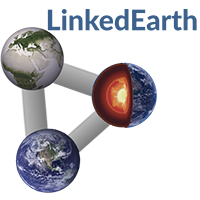FAQ
Q: Who is this hackathon for?
A: This hackathon is open to any researcher engaged in paleoclimate research interested in adding the geoChronR package to their scientific toolkit. The computing will done local on personal computers, so local installation R and the geoChronR packages will be required. Attendance will be limited to 50 scholars, with priority given to US-based applicants, ECRs and people from groups traditionally underrepresented in the geosciences.
Q: Do I need to know R to attend this hackathon?
A: Familiarity with the R and its basic use for data analysis is expected.
Q: What are the technical requirements?
A: You will need R (>3.6), and will almost certainly want RStudio, and a reasonably functional computer. Most relatively modern laptops work fine. You will also need, a stable internet connection, and access to Zoom and Slack.
Q: How do I register for the workshop?
A: Please fill out this form by Jan 26th, 2021.
Q: What will the schedule look like?
A: The hackathon will be held virtually, and take place over two days (Feb 8-9 2022) in the Pacific Standard Time zone (UTC-8) to accommodate the instructors schedules. The lectures will be recorded via Zoom and made available through our Slack channel for delayed viewing. The schedule can be found [here], once it is finalized (https://linkedearth.github.io/geochronr-hackathon/schedule). Schedule is subject to change. If you are participating in this Hackathon, make sure to connect through Slack to stay up-to-date.
Q: What will be expected of me?
A: Two days of your time, $0.00, and a willingness to experiment with new tools (coping with the minor frustrations that climbing any learning curve necessarily entails). On the last day, you will be expected to present what you managed to get through with your team, and share what you have learned in the process.
Q: Will I be working alone?
A: You will be working in teams of 4-5, expertly crafted by the organizing committee to balance out knowledge and time zone. That is, we’ll strive to put you with other folks on the same time zone as you are, and try to balance experience and expertise. If you are registering with a buddy and would like to be on the same team as them, please let us know!
Q: What will I get out of this?
A: Data analytic superpowers of unmatched proportions in this corner of the galaxy, that’s what! Seriously, code is only a facilitator of methods. At some point, if you want to use the tools in your research, you have to do the background reading to understand them. But we promise to make it easy for you to use and experiment with them, which helps developing an intuition for what they do. You will also meet fellow researchers at various career stages, hence building your professional network.
Q: Will this hackathon make me an R expert in 2 days?
A: That would be nice, but no. If you don’t know any R at the start, you will not learn it all here. The more knowledge you have going in, the more you should get out of the event. However, the event is designed for people of all levels to work and learn together about such topics as:
- The basics of paleo data structures
- Manipulate these structures
- Create age models in R using multiple algorithms
- Understand age model ensembles
- Conduct age-uncertain:
- Correlation
- Regression
- Principal components analysis
- Spectral analysis
- Generate publication-quality graphics
- Manage complex, reproducible paleoclimate workflows
There are different modules that cover these subjects. You may or may not get through all of them on the first go, but you will learn something any which way!
Q: Can I attend this hackathon, or other LinkedEarth hackathons, more than once?
A: Yes. Rome wasn’t built in a day, and depending on your data science proficiency going in, it make take a couple of rounds to get everything out of the hackathons we’re putting on.
Q: What if I love geoChronR so much I can’t stop using it?
A: That’s the goal. We hope that you all become avid users who use these tools to do science, and maybe even contribute new code and methods to the LinkedEarth community.
Q: OK, I’m sold. What happens next?
A: Please register here by Jan 26th, 2022.. Once you have, the organizers will review applications and email you back by Jan 28th. If you are selected, you will be asked to:
- do a little background reading
- install geoChronR on your computer
- run some tests to make sure it’s working
This is to make sure you can hit the ground running on Feb 8.
Q: My application was not accepted. What did I do wrong?
A: You did nothing wrong! There are many possible reasons, but in the past the lead causes of rejection have been:
- rationale for attending is not sufficiently articulated: You need to explain why it will advance your scientific career to do this. Vague responses to the questionnaires are often dismissed.
- too many people from the same research group. While we are honored that some PIs are encouraging their entire labs to apply, we strive to balance opportunities between universities/countries/continents. Therefore, we’ll only take 1-2 people from the same research group at a time.
- minimum requirements not met: as written earlier, we think the training is pretty good, but it cannot perform miracles. If you truly have never worked with paleoclimate data OR Python, we recommend that you gather a bit more experience with either (or both) before trying again. That way it will be much easier on you, your teammates, and us.
If you don’t get in on the first try, you likely will on the next round. Persist!
